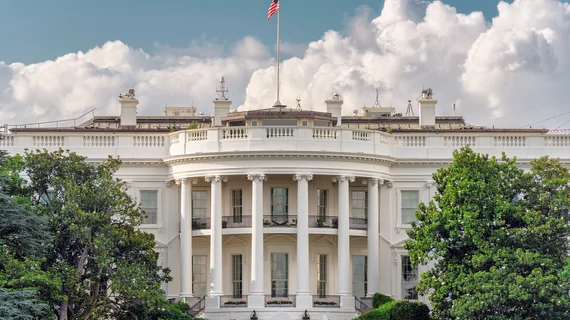White House announces plan to scrutinize private equity ownership in healthcare
The White House recently announced its intent to scrutinize corporate ownership of healthcare entities.
In a fact sheet released Dec. 7, the administration said it is launching a cross-government public inquiry into “corporate greed in healthcare.” Officials highlighted a recent review, which found that hospital mergers in concentrated markets led to price increases often exceeding 20%. Private equity ownership has ballooned in recent years, with $750 billion in such deals over the decade ending with 2020, including among radiology practices.
“The Biden-Harris administration believes that the healthcare system should serve patients, not corporate profiteers,” the White House said in its announcement. “The administration is concerned that our healthcare system is increasingly being financialized, with corporate owners like private equity firms and others maximizing their profits at the expense of patients’ health and safety, while increasing costs for patients and taxpayers alike.”
As part of the inquiry, the Department of Justice, Federal Trade Commission and HHS will issue a joint request for information. They’ll seek public input on how private equity and other corporate interests’ control of the healthcare system is impacting Americans. They plan to use the information to help pinpoint areas for future regulation and prioritize enforcement of laws against anticompetitive business practices.
Officials highlighted “roll-up” acquisitions, which “currently evade antitrust review,” as one area of concern. Businesses such as private equity firms and health insurers often use this strategy, which involves making a series of small acquisitions that can eventually lead to the consolidation of a market. Roll-ups also can contribute to worse patient outcomes while increasing healthcare costs, officials noted. In September, the FTC sued private equity firm Welsh, Carson, Anderson & Stowe, claiming it had used this strategy to consolidate the anesthesiology market, and planned to do the exact same thing in radiology. Last month, FTC Chair Lina Khan said the suit was meant to chill the consolidation of medical groups across the U.S.
“These serial acquisitions may violate the antitrust laws. However, each individual acquisition may fall below the size thresholds for reporting the prospective deal to the antitrust enforcement agencies before consummating the acquisition—making it more challenging for the enforcement agencies to identify anticompetitive transactions at the outset,” the White House noted. “Today, HHS, DOJ, and FTC announced that they will, to the maximum extent possible, engage in data sharing to help the antitrust enforcers identify potentially anticompetitive transactions that might otherwise evade ready review by antitrust enforcers.”
There’s been an uptick in the number of radiologists and other specialists moving under private equity ownership, a trend that warrants further investigation, according to a 2020 JAMA analysis. The number of radiology-dedicated practices in this tally was low. However, investigators did find a notable number of imaging physicians in multispecialty groups moving under an investor umbrella, from just four radiologists in 2013, up to 159 in 2015. Anesthesiology (19%), multispecialty (19%), emergency medicine (12%), family practice (11%), and dermatology (10%) represented the most commonly acquired medical groups. Radiology, cardiology, ophthalmology and obstetrics/gynecology also saw increases in private equity activity during the study period.
Private equity-supported groups in the specialty include Premier Radiology Services, LucidHealth, Radiology Partners, Rayus Radiology, Rezolut, US Radiology Specialists, SimonMed, Solis Mammography and Capitol Imaging.

